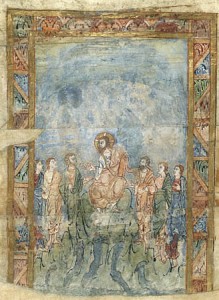Readings:
Isaiah 62:1-5
Psalm 96:1-3, 7-10
1 Corinthians 12:4-11
John 2:1-12 (see also “On ‘The Hour’”)

In the Wedding
Think of these first weeks after Christmas as a season of “epiphanies.” The Liturgy is showing us Who Jesus is and what He has revealed about our relationship with God.
Last week and the week before, the imagery was royal and filial—Jesus is the newborn king of the Jews who makes us co-heirs of Israel’s promise, beloved children of God. Last week in the Liturgy we went to a Baptism. This week we’re at a wedding.
We’re being shown another dimension of our relationship with God. If we’re sons and daughters of God, it’s because we’ve married into the family.
Have you ever wondered why the Bible begins and ends with a wedding—Adam and Eve’s in the garden and the marriage supper of the Lamb (compare Genesis 2:23-24 and Revelation 19:9; 21:9; 22:17)?
Throughout the Bible, marriage is the symbol of the covenant relationship God desires with His chosen people. He is the Groom, humanity His beloved and sought-after bride. We see this reflected beautifully in today’s First Reading.
When Israel breaks the covenant she is compared to an unfaithful spouse (see Jeremiah 2:20-36; 3:1-13). But God promises to take her back, to “espouse” her to Him forever in an everlasting covenant (see Hosea 2:18-22).
That’s why in today’s Gospel, Jesus performs His first public “sign” at a wedding feast.
Jesus is the divine Bridegroom (see John 3:29), calling us to His royal wedding feast (see Matthew 22:1-14). By His New Covenant, He will become “one flesh” with all humanity in the Church (see Ephesians 5:21-33). By our Baptism, each of us has been betrothed to Christ as a bride to a Husband (see 2 Corinthians 11:2).
The new wine that Jesus pours out at today’s feast is the gift of the Holy Spirit given to His bride and body, as today’s Epistle says. This is the “salvation” announced to the “families of nations” in today’s Psalm.
On “The Hour”
”The Hour” of Jesus is a key theme in the Gospel for the Second Sunday in Ordinary Time (Year C). Indeed, it’s a key theme in the entire Gospel of John. Literally, “The Hour” of Jesus is the time of His crucifixion, His self-offering on the cross. But there is also a “spiritual” way to read the passages that refer to Jesus’ hour—a way of reading that reveals how “the Hour” of Jesus continues in the Mass: Jesus says that the hour is coming when we’ll worship in a new way—in Spirit and in truth (see John 4:23-24). We’ll gather in that hour as “Greeks” and “Jews” to celebrate a new Passover feast, He says (see John 4:23; 12:20-23). In that hour, the dead will hear His voice and have life by His Word (see John 5:24-25). And in that hour we will receive miraculous, new wine (see John 2:9-10) and the “fruit” of the grain of wheat sown in the ground (see John 12:13-24). We have here, in the description of Jesus’ “hour,” a picture of the Mass. The Mass is a spiritual worship in which we join the choirs of angels in heaven. It’s a living remembrance of His last Passover supper in which we who were once dead in sin hear His Word in Scripture, and receive living bread and new wine. When His hour finally came, “blood and water” flowed from His side (see John 19:34). It was a final sign that His “hour” continues in the Sacraments of the Church, especially in Baptism and the Eucharist. Every time we celebrate the sacred mysteries, we enter into “The Hour” of Jesus which is signified and made present in the Liturgy (see Catechism, nos. 1165, 1225).
Saint Augustine
Sermons on St. John’s gospel, no. 8,1
The water changed into wine
The miracle by which our Lord Jesus Christ changed water into wine is not at all astonishing to those who know that God is its author. Indeed, it is exactly the same thing which produced wine in those six jars on that wedding day … and which renews this transformation in the vines each year. That which the servants poured into the jars was changed into wine by the action of the Lord; in the same way the rain that falls from the clouds is changed into wine through the same action of the Lord. And yet we do not wonder at it because it is repeated every year; custom has caused astonishment to disappear. Yet it is far more worthy of our attention than what took place in the jars filled with water.
Indeed, who is there who dreams of considering the work of God who directs and governs the whole world? Isn’t that person then seized with astonishment and as it were crushed beneath the weight of these miracles? If they consider the power enclosed within a single seed of the first species to come, they will discover a great reality there that astounds the observer. But people, otherwise occupied, have become insensible to the works of God, which would daily provide motives for praising the Creator. This is why God reserves to himself the work of certain unusual wonders so as to awaken them from their sleepiness and lead them to praise him.
